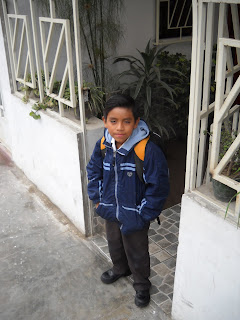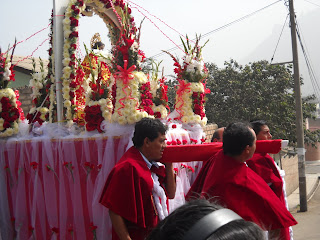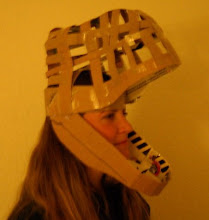I am going to answer many questions now, or at least attempt it. I had no idea what I was really getting into, so was not able to tell anyone much before I came. I still don't know a lot. I am a Small Business Development Volunteer in Peru and that is all I knew coming in. To answer a few things though:
1. The small business situation here:
The Peruvian economy is pretty interesting. It has been getting healthier over the last few years but still has a very long way to go. There are many, many small businesses. And when I say small businesses I mean a woman selling rolls out of a sack or a small family that runs a fruit stand. Micro-businesses are technically one to ten people but most often seem to be four or less and very often only one. Businesses this size are almost all "informal" - not paying taxes or getting benefits, not trained or aware of any methods of organization or expansion, and barely surviving. 73% of businesses in Peru are informal. This accounts for 88% of all employment. It's almost everyone. This has lots of effects. It's difficult and expensive to formalize because the few formal businesses have to pay enough taxes to support the entire civil structure (which is needless to say not in great shape.) There are very, very high levels of poverty here.
2. Types of things I may be doing:
I have been learning about all of this and more while simultaneously getting to meet/hear about the many Volunteers who are working in my program in Peru. The work is crazy varied but I am very excited for all of it. I can end up in a place where no one has been before and organize from the ground up. I have heard stories of organizing groups of women in tiny huts who weave tapestries into one organization and formalizing so that they can export. I have talked with people who have gone and found whole towns looking for another source of income but with only sketchy ideas, so helping them set up beekeeping and honey bottling, or fish farms, or other things like that. I met a guy who organized elderly shrimp fishermen on the coast to form one organization and formalize to make health care and retirement available to them. I have heard people organizing whole groups of various artisans to get a shop in the next decent sized town and take turns running it to reach larger markets.
Sometimes your area is larger or already more organized. One guy worked with another group of shrimp fishers to start farming the river shrimp with high level technical training to increase from 10,000 shrimp a year to a few hundred thousand and was helping work with them to contract with Peruvian supermarkets. One guy I met was in a larger town and created a Chamber of Commerce. Business volunteers also do a lot of simpler trainings and consulting with existing businesses to teach them to keep books and how to reach other markets.
Everyone has numerous projects. You have one or two main ones like the ones above or crazy different, seems most people end up teaching evening classes on English, and everyone gets involved with the youth in their community to work to keep them in school, teach them basic organizing skills young, help them get into college if they want, etc. People also create sports organizations, teach people to garden and eat better, have knitting clubs or dancing clubs or whatever they are into.
3. How a Peace Corps volunteer gets placed, how projects start:
A community has to formally request a Peace Corps Volunteer in order for one to be sent somewhere. The Country Directors and Program Directors travel around and talk to people at length about it before these decisions are made. Sometimes it is for more specific reasons and sometimes a village just wants general help. This means when I get where ever I am going I will have what is called my "local counterpart," the person who will be my main go-to contact until I get my feet under me. This person may or may not actually be helpful.
When I first go to my site in a couple months, I spend the first three months working exclusively on integration and on a community assessment. I go around and meet as many people as I can and find out as much about my community/area as I can. I will talk to doctors (or whoever does that sort of thing there) about health, nutrition, population, infant mortality, etc. I will talk to the teachers about rates of matriculation, curriculum, ages of students, etc. I will find out how the local government works and talk with everyone in it extensively. I will find out how the local criminal justice system works, how the retired survive, etc. I will learn the culture, customs, and history and see how well I can become a part of the community. I will likely bathe in a bucket and wash my clothes in a river. It will be rad.
As I do my community assessment I will find out what people want. I can't just pick a project. While I think bee-keeping sounds rad, the ideas will have to come from the people who will be doing the work long into the future for it to work at all. So, I really will have no idea what I am doing for quite a long time from now. So, I will prolly end up working with some organizations. I may help some people create organizations. I will prolly work with every sector of public governance and I will likely work with every generation and every type of business available at some point or another.
This is a pretty vague answer, but I am strangely comfortable with it. In fact, quite thrilled.
4. My schedule:
I will be in training for ten weeks. Just finished week one. I think I get my site assignment on Week 8? When I go to site, I spend three months in community assessment mode. Then I have one more week back here prepping/training more to launch into projects. After six months on site, I come in with a member of my community for an intensive on Project Design and Management. Some time(s) later I will have project specific technical training depending on my specific needs (How do you build a fish/honey farm anyways?) After a year on site I will have my mid-service meetings and checks-ups, etc. Then I produce some reports near the end and Close of Service is August 20th, 2012.
They say the entire first year is an emotional and mental wringer. They say no one even starts to get comfortable or feel productive until after at least a full year on site. They say the first year feels all downhill. They say I will want to come home every day and that maybe I will. They say the second year, things start clicking. They say that at the end of the second year, you finally feel like you are really doing something, that you are right in the middle of something when it's time to go home and that super many people end up signing up for a third year.
Ha. Be prepared for anything from me. Preemptive apologies for emotional roller coasters.
Whew. Done with this answering questions thing for now. Ask me more and I will try and answer them, but there is not much more that I know. For everything they tell us, they tell us there are a hundred exceptions. There are no rules.
I am spending most of my time on language now. I am having awesome conversations with my family. My dad was talking to me the other night about how much he likes Obama, how he didn't like Bush, how he thought Gore was boring but smart and was sad about that election. Then he casually asked how well I know Obama. I said I didn't really but that I did once have dinner with him five years ago. He nodded and continued the conversation. I think he's pretty sure we all get to meet the president at some point and have dinner.
Father's Day is apparently a huge deal here. My family keeps telling me that we are all going to drink a bunch of beer and wine tomorrow and also that we will be cemetery hopping visiting dead forefathers. So there's that.
Right now it's almost 11am, I have been sitting at the kitchen table since 6:30, alternating between Spanish workbook and this blog, and we just finished the third meal today. Everyone seems to come to the table once an hour and sit down for more food. It's ridiculous. Peru is totally weird. My sister just went back to the kitchen to start preparing round four. She knows I am finding this hilarious and is teasing me about it.
The other PCTs (Peace Corps Trainees) and I went out last night for some serious American partying. We found an empty tiny dive bar and took it over all night. It was for Julianne's bday. The local liquor here, Pisco, is delicious. I am staying in with my family practicing Spanish the rest of the weekend, but that one evening of all English last night was very nice. Next weekend, me and all the other business trainees are going up to some ruins at like 13,000 feet and camping there. We are riding horses to get there. While we are there, we will be studying the structures of successful micro-businesses in rural tourism. But also, it will be awesome.
The jerga (slang) word for a bump on the head is chinchon and I have one.
Here are a million pictures, with captions:
My street
My neighborhood
My littlest bro
My house, bro and mom
Walking to Chiclacayo, to the training center, with other trainees and local kids on their way to school
The creepy fog really never does go away, this is on the morning walk
La Puerta Magica (the Magic Door), I walk through it twice a day - it's super magic
Un mototaxi - my dad drives one
Fire crackers kept going off during Spanish class, we came out and found the Christ procession, middle of a random weekday
The lady in the front was lighting smokes to light the bottle rockets with. I like her.
They asked us to carry for a while. Both these guys in front are Chris. But the one on the right is Boston Chris.
Omar and I carrying on the back.
Except he's tall, so I wasn't really carrying anything.
This is what happens when we get out of the training center an hour earlier than our moms expect us home.
My sister is a Kindergarten teacher. This means that sometimes she sits at the table and builds a couple dozen lions out of coffee cans and felt.
Chosica
More Chosica
Me and the Jesus. I don't feel like fixing this right now, so this is sideways me and sideways Jesus.
Since there is always something weird going on in the street in Peru, here is a random Chinese dragon. Or, rather, slug.
Peru 15, Party 1
The birthday girl
My favorite pic from last night.
Ok. More studying Spanish and I need to help my brothers with their English homework. Hasta.
























See! No longer a lonely blog.
ReplyDelete